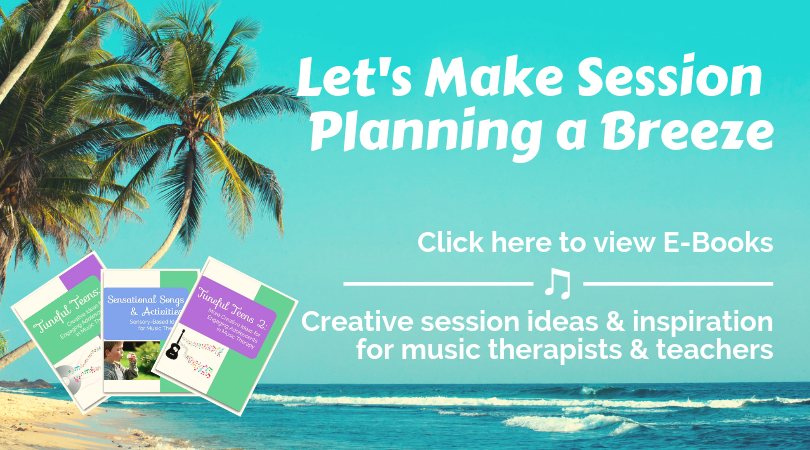Two weeks ago I wrote a blog post that generated a LOT of comments!
I love when this happens because it helps me feel like I’m not alone with some of the things I’m going through in my sessions.
This particular blog post was about breaking free my obsession with session planning. And realizing that extreme session planning was more to meet my own needs and my comfort level then really meeting the needs of my clients.
I began to realize that the more I let go of that need for structure and planned activities, the more effective my sessions were. This was because I was directly responding to my clients and what they needed at that moment.
This is definitely not something I could have done as a practicum student or even an intern! This is a skill I’ve built up by having a large….very large….repertoire of songs and activity ideas in my memory bank. This allows me to be flexible and “in the moment” because I can draw from that memory store and pull up effective activities based on what my clients need.
Here’s another little nugget that’s helped me through many assessments.
Assessments can be intimidating because this is the very first time you’re meeting the child. This is when you need to be most flexible and “in the moment” because you’re getting to know the child throughout this session.
So I began bringing a HUGE variety of instruments, props, books, stuffed animals, etc. Then I would set my “bag-o-tricks” in front of the client and just watch and wait. At this moment I was observing what interests him…and in turn what will motivate him!
One of my clients LOVES the thunder tube – the sound of it, the feel of it, the look of it. Once I realized this, I started using the thunder tube to work on his goals. We can work on expressive language (“I want the thunder tube please!”), social skills (after your turn, pass it to Mary), sustained attention, selective attention, motor skills, the list goes on and on! Because I paid attention to what interests him, we’re able to work on his goals in a way that’s engaging and motivating for him. Now we’re transitioning to other instruments that sound similar (the drum because it can make a loud booming noise just like the thunder tube!)
I’d love to hear more comments from YOU! How do you plan or “not plan” for your assessment sessions? Leave a comment below and let us know!



Yes to everything, Amy. I particularly love what your comments about assessments of new clients. I still struggle with the idea of providing freedom for exploration within a larger container of safety and boundaries. I want a client to observe the stack of tambourines on the shelf, but I need to be ready to catch them and set boundaries when a little guy decides to knock everything off the shelf in one giant sweep.
Or…and this happens a lot…a child exploring the cabasa before tossing it over their shoulder.
But one of my favorites: a little boy who turned an ocean drum into a tire and rolled it around the room, running over and exploring everything through the safety of a secondary object.
Turning an ocean drum into a tire…now that’s creativity!
Great post! I plan out my assessments bc they are all IEP based and I still come across goals they struggle with that I’ve never worked on before.
Thanks for sharing!
No problem!
Wonderful post Amy! I love to hear how others therapies work though their treatment sessions. As an occupational therapist, I have specific testing that has to be done for billing purposes, although, I use my “therapeutic eye” to judge when to start each standardized assessment with a new client.
When I walk into a home or school, I like to first conduct the interview with the parent. I let the parent know that as we are talking I would like the child to engage in his/her typical play routine. As I am talking to the parent, and discovering their areas of concern, I can observe the child during play. Will they play with their toys? Are they curious about who I am? I also leave a bag of toys out,and watch to see if the child will go inside the bag. Is the child tolerant of my voice? There are many things I learn just though observation of play that allow me to continually grow as a therapist.
Hi Christina!! Thanks for chiming in – I have learned so much from you and from our co-treatments together! I also agree that just observing the child before implementing any planned intervention can be very powerful.
I was just writing a note yesterday, and saw one of my original findings in the initial assessment to be highly valuable and something I had been overlooking in the sessions. I find those initial assessments a huge tool even before we have gotten to know our clients. Some of the things I re-tread from those initial meetings are things I have noticed, not knowing the client. Although they are subtle things, are invaluable to their progress!
Antoinette, that is such a great reminder for all of us. I love the idea of going into the assessment starting with a clean slate and looking at the child with a fresh set of eyes; no preconceived notions (that’s hard to do!) It is powerful to look back and remind yourself of those initial observations.